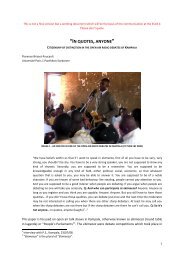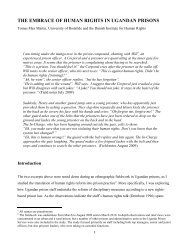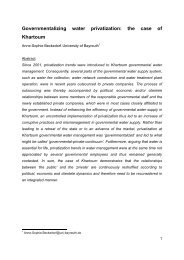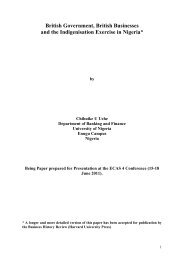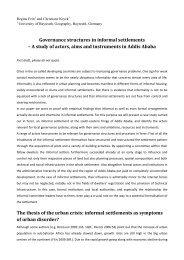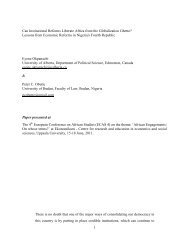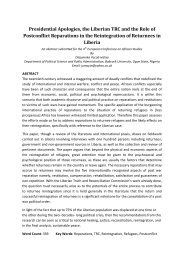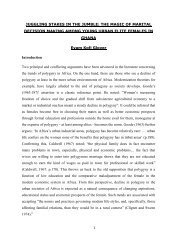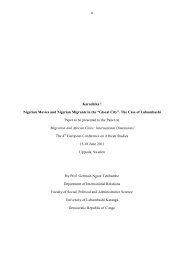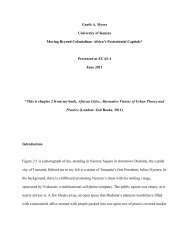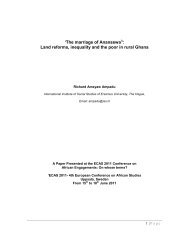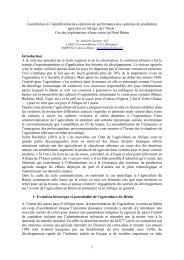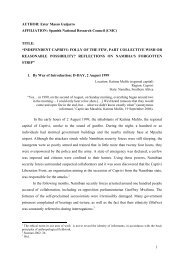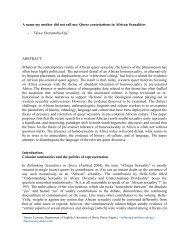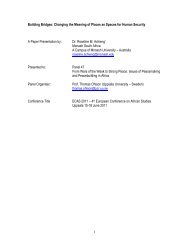Alemayehu Kumsa - Full paper - The Nordic Africa Institute
Alemayehu Kumsa - Full paper - The Nordic Africa Institute
Alemayehu Kumsa - Full paper - The Nordic Africa Institute
Create successful ePaper yourself
Turn your PDF publications into a flip-book with our unique Google optimized e-Paper software.
Concepts of Power<br />
At the starting point of our discussion we shall define two key concepts – power and<br />
authority. <strong>The</strong> absolutely basic common core to all conceptions is power: two noted political<br />
sociologists in their book define power as “the capacity of a person or, more often, a group<br />
and institution to be able to manipulate and shape the views and actions of people” (Orum and<br />
Dale 2009:2), and the doyen of the theory of power Steven Lukes gives the concept of power<br />
in these words: “the notion of the bringing about of consequences, with no restriction on what<br />
consequences might be or what brings them about.” (Lukes1979:634-35). <strong>The</strong> power of a<br />
river, for example, is manifested in its causal effects: it erodes a fertile top soil, transports it<br />
from highlands to low lands, like Blue Nile which annually transports millions of top fertile<br />
soil from Oromia highlands to Egypt meandering through central Sudan until it makes delta in<br />
Lower Egypt to finally disappear in the Mediterranean Sea. Similarly, the power of electricity<br />
manifests in the illumination of light bulbs, in heating rooms, and in the operation of<br />
underground railways. This type of power can be identified as natural power. When used in<br />
relation to human beings in social relations with one another, it is attributed to persons or<br />
collectivities or, sometimes, to the system or structures within which they act. All members of<br />
a society affect the society in which they live and one another in countless ways all the time;<br />
any given use of the concept of power – and related concepts such as authority, influence,<br />
coercion, force, violence, manipulation, and so on – picks out ranges of such consequences<br />
that are held to be significant in specific (and related) ways. A conception of power useful for<br />
understanding social relationships must incorporate a criterion of significance – that is, it must<br />
imply an answer to the question: what makes the consequences brought about by a significant<br />
in such a way as to count as power? For such main questions, there is wide range of answers<br />
depending on the view of the authors. For some philosophers, what is essential to power is the<br />
realization of a will or desire. This will yield an intentional conception of power which may<br />
be potential; the British philosopher John Hobbes (1588-1679) described power in these<br />
words in his known book Leviathan (1651): “the power of man (to take it universally,) is his<br />
present means, to obtain some future apparent Good”. “And is original, or instrumental”<br />
(Hobbes 1985:150). Hobbes identified many forms of power, but we shall take only two of<br />
them which are described in this definition:<br />
Natural power is the eminence of the faculties of body, or mind: as Extraordinary Strength,<br />
Form, Prudence, Arts, Eloquence, Liberality, Nobility.



